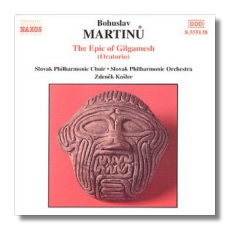
The Internet's Premier Classical Music Source
Related Links
- Martinů Reviews
- Latest Reviews
- More Reviews
-
By Composer
-
Collections
DVD & Blu-ray
Books
Concert Reviews
Articles/Interviews
Software
Audio
Search Amazon
Recommended Links
Site News
 CD Review
CD Review
Bohuslav Martinů

The Epic of Gilgamesh
- Ivan Kunjer: Gilgamesh
- Stefan Margita: Enkidu and Hunter
- Ludek Vele: Spirit of Enkidu
- Eva Depoltova: Woman
- Ludek Vele: Resonneur
- Milan Karpisek: Spoken Word
Slovak Philharmonic Orchestra & Choir/Zdeněk Kosler
Naxos 8.555138
For those of you not familiar with the Gilgamesh epic I will offer a summary. Gilgamesh is the first "hero" known. The story goes back about 3,000 BC. It is a story about "he who saw the deep"* that is, death. Gilgamesh is not a traditional hero. He is depicted as a tyrant who uses his kingly right to deflower the bride-to-be at the wedding. He "leaveth no spouse to a husband." Still, the epic celebrates him. The goddess Aruru creates Enkidu from the desert sand so that there might be someone to protect the people from Gilgamesh (like I said, some hero). Well Enkidu and Gilgamesh fight so that the men's brides will be safe. Gilgamesh wins and Enkidu becomes his sidekick. They travel around fighting beasts and monsters. One of the beasts has been sent by a goddess that Gilgamesh dumped. Gilgamesh kills it but the gods decide to kill Enkidu as revenge. Enkidu dreams of death ("who, my friend, is not defeated by death"?) and slowly fades away. [This next part is not in the oratorio. Gilgamesh wanders, seeking a wise man who relates the story of "the flood". This predates the Old Testament version by thousands of years.] Gilgamesh, in his grief, continues his journeys and sails across the waters of death. He races against time but realizes he cannot defeat sleep and will also die. He calls forth the spirit of Enkidu and they embrace. Gilgamesh (and the chorus) speak with the spirit of Enkidu asking questions about death, but Enkidu's replies are enigmatic. If you have not read the book, it is better than the oratorio in the sense that it offers details that cannot be included in Martinů's work, mainly because of the lack of relative information available at that time.
Okay, now to the music itself. I have no reference with which to compare or contrast this recording. The Penguin Guide to Compact Discs rates this higher than the only other recording available. I know I am impressed with the recording, the singers and the orchestra. The music is felt before it is heard; when the chorus suddenly sings "Gilgamesh!" it is stunning. Throughout, the music fits the epic perfectly. Martinů's quirky music adds to the feeling of an ancient time and place. The Czech language is also part of the feeling conveyed. The whole thing is, simply, awesome. It is also the first oratorio I can say that I have liked.
This was previously released on Marco Polo 8.223316 and I can discern no difference in the sound. This Naxos release is less expensive so you might want to share it with a friend. I like the picture on the Naxos cover better than on the Marco Polo. So it goes.
* All quotes are from the text of Martinů's work.
Copyright © 2002, Robert Stumpf II


















